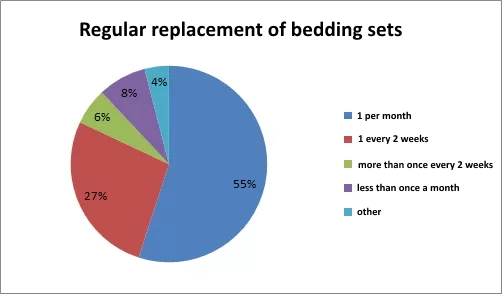And have you ever wondered how often should you change your bed sheets, or do you just do as has been the custom in your family for several generations in a row? When choosing to bed, many hostesses consider not only the quality of the fabric, coloring but also its antibacterial properties, which affect how often they are changed.
Frequently Asked Questions
1. How often should you change your bed sheets a month?
Changing your bedding daily is overkill. But, still, how often should you do it to maintain freshness? Here’s what experts who study sleep and the effects of the environment on restful sleep recommend.
Changing a twin bed set in winter should be done at least once every two weeks. Linens for double beds are changed once a week. This is due to the number of people resting and, consequently, greater exposure to its contamination.
In summer it is necessary to change bed textiles more often, so for the warm season of the year it is better to choose thinner linen, it is easier to wash, it dries faster.
2. When and how to properly change the bedding for healthy and sound sleep?
Unfresh textiles, in addition to unpleasant odors, can cause skin allergies and other types of negative reactions of the body. Bed mite, and it is proved by science, begins to multiply due to the dying cells of the epithelium. Therefore, changing the bed promotes good health and healthy sleep.
In addition to the usual change of linen, it is recommended to shake out and re-clean the sheets every day. The sheets should be changed more often than the duvet covers. It is just as important for your health to rinse the sheets well when washing them and to dry them outdoors. How often should you wash your bed sheets?

The consequences can be allergies, which will manifest as sneezing, stuffy nose, lacrimation, swelling. In some cases, the occurrence of asthma, skin dermatitis, eczema, acute viral diseases are possible. In addition to health hazards, the hygiene aspect is also important, because sleeping on fresh, tasty-smelling underwear is much more pleasant.
3. What else is important to know about hygiene in the bedroom?
In addition to regularly washing the bed linens, it is important to remember about the cleanliness of other bedding. To ensure that the mattress does not get dirty so quickly, it is more convenient to use a mattress cover, which can easily be washed in a washing machine.

Keep sheets clean between washings
If you are using pillows and blankets made of delicate fillings such as silk, goose down, or cashmere, you will need dry cleaning services.
Many wool fillings, bamboo, eucalyptus, and synthetics are machine-washable. Follow the label directions, as it is important to wash blankets and pillows at a certain temperature so as not to ruin the filling.
After washing, do not hang them on a dryer, but spread them out on a flat, horizontal surface. This way the filling does not accumulate in clumps and dries faster.
4. What About Other Bedding?
For your convenience, we suggest how often should you change your bed sheets you keep the table and use it when necessary:
| Sleeping Object | Frequency of cleaning/laundry |
| Bedding | every 2 weeks |
| Mattress cover | once every 1-2 months |
| Pillows | every 3 or 4 months |
| Blankets | Every 3-4 months |
| Mattress | At least twice a year |
There are times when lines need to be changed, even if they have only been used once:
- If guests stayed overnight, be sure to wash the set they slept on;
- If you feel you have recovered from a cold or flu. Bacteria left on the pillow can trigger a new round of illness;
- If you’ve been doing extensive rearranging or drilling through walls.
5. What happens when you don’t change your sheets? What if you don’t?
It’s not a question of cleanliness or squeamishness, but of health.
Everyone loses millions of skin cells every day, and a good portion of those cells remain in bed. And at night people sweat and excrete sebum, which remains on sheets, penetrates mattresses and pillows, and becomes a breeding ground for dust mites. The products of which are the strongest allergens.
In a dirty pillow and mattress, you can find 16 different kinds of fungus, as well as Staphylococcus aureus, campylobacter, and norovirus… b-r-r. Anyway, it’s time to check if everything is okay with your bedding.
Factors that warrant more frequent washing
- dust mites. Actively develop in the unwashed laundry. Can provoke a decrease in immunity or an allergic reaction;
- Bacterial diseases. A favorable flora for pathogens is the sweat absorbed by sheets and duvet coverings;
- aesthetic beauty. Sleeping on freshly laundered linens is much more pleasant than on a frayed and stained set with wool, dander, and hair.
Best way to wash sheets
In summer, change the bedding weekly, because in the hot season sweating increases. In winter, once every 2 weeks is enough, but if you sweat often and in colder times, be sure to wash the sheets once every 7 days.
For natural fabrics, use temperatures up to 60 degrees and revolutions not exceeding 1,200, and for delicate fabrics, use 30-40°C with the minimum number of revolutions. For children’s laundry, heat treats at 800 pm and be sure to iron. If the stains on your sheets cannot be removed at home, contact a dry cleaner.
Hand laundering bedding is a time-consuming process since oversized bedding is now popular.
In such cases, paying attention to the entire area of the duvet cover or sheet is almost impossible. The optimal way out – washing in the machine, but you need to observe a number of nuances so that the fabric does not fade and not “shrink” after washing.
Washing modes. The Best Way to Wash Your Bedding
It is important to change the bedding in time, otherwise, it will affect the process and quality of washing. If snow-white linen is heavily soiled, soaking is required, otherwise, the fabric will soon be washed and grayed. Modern automatic washing machines are equipped with a soaking function, so be sure to turn it on if you do not change the bed in time.
Choosing a Washing Mode
Choosing a washing mode
The mode is chosen based on the fabric of which the set is made.
Programs for washing adult bedclothes in the dispenser
| Material | Program | Spin speed |
| Cotton | Any “Cotton” or “Standard” program is fine | 900-1 200 |
| Flax | ||
| Polyester | ||
| Poplin | “Delicate” | 400-800 |
| Silk | ||
| Synthetic | ||
| 3D |
Most sets consist of several types of fabric and have a pattern, so it’s important to look at the manufacturer’s label the day before washing. The labels detail how to handle this particular set, and whether it can even be washed in the machine. Be sure to read the manufacturer’s information before washing to avoid unpleasant consequences.
How often should you change your bed sheets? Age group
The second factor that determines how often to change the bedding is the peculiarities of a person’s life, primarily his age and habits.
For an adult person
The frequency is influenced by a person’s individual body features and cleanliness. If you shower every day before going to bed and sleep in pajamas or nightgowns, the bed will need to be changed once every 7 days. But in a hot period or with active behavior in bed you will have to change the sheets more often, even daily.
Tip! Even if the bed is blanket-proof during the day, you shouldn’t snack on the bed, lie on it with shoes on or let your pets get in, especially if they’re walking outside.
If the washer has a small capacity or there is no way to hang the entire set out to dry at once, it is acceptable to divide the laundry. Sheets get dirty in an average of 3-7 days, duvet covers – much slower, for 10-15 days, but the pillowcases, on the contrary, get greasy very quickly. If there are problems with the scalp (such as dandruff) or face and neck (irritation, acne, greasy shine) we recommend changing the pillowcases every day.
Sleeping Girl
Night pajamas or shirts send to the wash at least once every 2-3 days, and bath towels – after 4-5 washes. It is better to dry laundry in a well-ventilated room, and allowed outdoors if the wind does not pick up a lot of dust, as well as in the bathroom on special dryers.
For newborns
In this matter, it is better to overdo it. Pediatricians recommend a change at intervals of once every 3 days, but most moms re-do the bed several times a day, especially if the baby sleeps without a diaper.
Tip! Instead of expensive sheets, use a flannel diaper 100-120×80-100 cm. They absorb well, withstand repeated washings at 90 ° C, conveniently lie in the crib and easily removed from the mattress.
Delicate baby skin does not tolerate a long stay in a stale bed. These babies are more likely to develop dermatitis or allergic reactions. Therefore we recommend changing the bed and underwear for babies at least once a day. Such care will allow the child to gain strength and grow up healthy and active. It is better to wash diapers and clothes of newborns with soap, but not with powder.
Sleeping infant
For children 2-13 years old and adolescents
In cribs, you need to change the bedding as often as possible. Some moms iron such linen on two sides and even boil it, but this is a purely individual desire of parents. It is enough to wash the sheets in the machine, using baby powder, and your set will be ready. B. and L. Nikitin, the authors of a famous book on raising children, advised not even ironing the laundry, so that the child’s body gets used to fighting bacteria.
Often children love to eat in bed cookies, apples, buns, and then do not sleep because of the crumbs. So make it a habit for all family members to eat and have tea only in the dining room. And yet children are children. They move a lot, the bed serves as a plaything: the castle, then the pirates’ ship. Babies play in the sand, grass, interact with other children. So we remind babies to rinse every night before going to bed, to wash their faces after a walk, while every day we check the bed for freshness. Usually a child’s bed has to be re-laid once every 4-7 days.
Children’s bed
Tip! At daycare, the bed is changed once a week, but if your child is uncomfortable and their sheets get dirty quickly, talk to the teachers. If you wish, you can bring a signed extra set and demand that the bed be changed more often.
From the age of 12-13, kids begin a difficult, adolescent period. Their bodies begin to change, preparing for adulthood. The composition of the sweat changes, it is often allocated more abundantly, all the body systems periodically fail. A common problem is acne, acne. Bedding is recommended to change every 4 days. If the teenager is concerned about his skin – replace the pillowcases and personal towel daily. As an option – use as towels and pillow covers cotton or linen cloths, which can be cut larger.
For the sick person
For bedridden patients, the bed is re-done twice a week: since the person spends most of their time in bed, the linens get dirty faster. At a fever, when bed rest is prescribed, it is not worth disturbing a person, especially a child. But as soon as the fever subsides, and the large will be able to get to the kitchen to eat, you need to immediately air the bedroom and change the bedding. This is important because linens not only absorb abundant sweat because of the temperature, but also disease-causing germs. They also fill the air. It is advisable to wash the set at 90 degrees or with the addition of antibacterial soap.
Sick in bed
A person who is recovering is still advised to change the bed every 3 to 4 days. He still spends a lot of time in bed and the body is weakened, so there is an increased risk of dermatitis and allergies caused by insufficient fresh linens.
The takeaway
If bedding is not changed in a timely manner, a person can get a rash, itchy eyes, runny nose, and cough. The most harmless consequence is probably the unpleasant odor coming from an untidy, sweaty bed.

